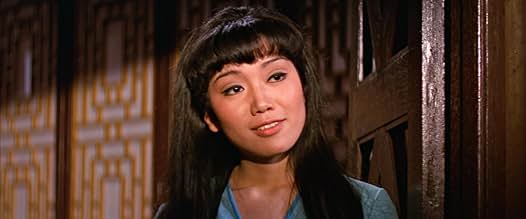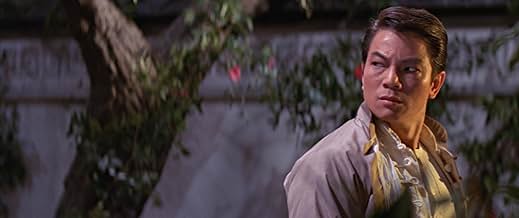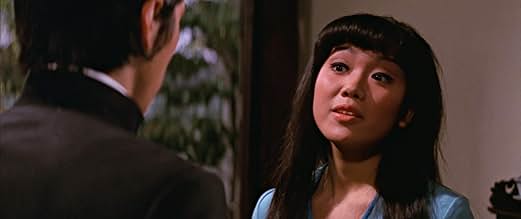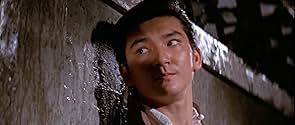AVALIAÇÃO DA IMDb
7,0/10
775
SUA AVALIAÇÃO
Adicionar um enredo no seu idiomaChina 1925, a man returns to track down a kill the men who murdered his brother.China 1925, a man returns to track down a kill the men who murdered his brother.China 1925, a man returns to track down a kill the men who murdered his brother.
- Direção
- Roteiristas
- Artistas
- Prêmios
- 2 vitórias no total
Ku Feng
- Feng Kai-shan
- (as Feng Ku)
Pin Ho
- Generalissimo Hu Hu Cheng
- (as Hoh Ban)
Hung Liu
- Feng's Advisor
- (as Liu Hung)
Cliff Lok
- Feng's Assistant Killed in Lift
- (as Chin Tung)
- Direção
- Roteiristas
- Elenco e equipe completos
- Produção, bilheteria e muito mais no IMDbPro
Avaliações em destaque
Vengeance gets off to a bloody, visceral, frantic, and amazing start. The way it cuts between the stage show and the violent fight scenes - just great, effective editing. And I also loved how cold and brutal the main character was straight away, when his quest for vegetable began. Plus a lot of the fight scenes are shot in a very intimate, in your face kind of way, and it made the already quite gory action have even more of an impact.
Things slow down in parts of the second act, as they often do. I also wasn't really sure about the romance aspects of this movie, and didn't really feel it, but at least it's brief.
But what matters most is that the main premise, while simple, is executed fantastically. David Chiang is also great in the lead role (he might be becoming my favourite of the regular Shaw Brothers actors) and the action - much of its relegated to the opening scenes and climax - satisfies. It's in the upper echelon when it comes to classic martial arts movies; that's for sure.
Things slow down in parts of the second act, as they often do. I also wasn't really sure about the romance aspects of this movie, and didn't really feel it, but at least it's brief.
But what matters most is that the main premise, while simple, is executed fantastically. David Chiang is also great in the lead role (he might be becoming my favourite of the regular Shaw Brothers actors) and the action - much of its relegated to the opening scenes and climax - satisfies. It's in the upper echelon when it comes to classic martial arts movies; that's for sure.
VENGEANCE (aka KUNG FU VENGEANCE, 1970) was one of the earliest collaborative efforts of director Chang Cheh and his star team of David Chiang and Ti Lung. It is more of a traditional gangster film than a kung fu film and offers a dark, atmospheric feel closer to Hollywood film noir than to similarly themed Hong Kong crime films. The film is, in fact, a loose remake of John Boorman's crime thriller POINT BLANK (1967), itself an adaptation of Richard Stark's novel, 'The Hunter.'
In 1920s-era Peking, Chinese Opera performer Ti Lung confronts his boss (Ku Feng) over the boss's attentions to his straying wife and takes on a room full of hatchet-wielding henchmen before dying a bloody death after a valiant fight. As Ti's brother, David Chiang, who shares no scenes with his frequent co-star (other than a brief flashback), comes to town seeking revenge and eventually fights it out with all the crime bosses and their minions, culminating in a big fight in which David helps one gang beat another only to have the winning gang turn on him. Although the film is generally slow-moving, it has a number of compelling scenes and expert use of cramped interiors in well-designed period settings.
The film has little in the way of actual kung fu, with more of an emphasis on knife fighting, slashing and judo flips in its three major fight scenes than on hand-to-hand Chinese boxing, yet it is clearly a lead-in to subsequent gangster-style kung fu films by Chang Cheh such as DUEL OF THE IRON FIST, which also starred David Chiang and Ti Lung, and BOXER FROM SHANTUNG, which starred Chen Kuan Tai, who appears in a bit part in VENGEANCE.
In 1920s-era Peking, Chinese Opera performer Ti Lung confronts his boss (Ku Feng) over the boss's attentions to his straying wife and takes on a room full of hatchet-wielding henchmen before dying a bloody death after a valiant fight. As Ti's brother, David Chiang, who shares no scenes with his frequent co-star (other than a brief flashback), comes to town seeking revenge and eventually fights it out with all the crime bosses and their minions, culminating in a big fight in which David helps one gang beat another only to have the winning gang turn on him. Although the film is generally slow-moving, it has a number of compelling scenes and expert use of cramped interiors in well-designed period settings.
The film has little in the way of actual kung fu, with more of an emphasis on knife fighting, slashing and judo flips in its three major fight scenes than on hand-to-hand Chinese boxing, yet it is clearly a lead-in to subsequent gangster-style kung fu films by Chang Cheh such as DUEL OF THE IRON FIST, which also starred David Chiang and Ti Lung, and BOXER FROM SHANTUNG, which starred Chen Kuan Tai, who appears in a bit part in VENGEANCE.
if compares SB's martial arts films with the Japanese samurai films, the SB's films and all the other similar genre films produced by other HK movies companies were nothing but child's play and big laugh. everything was shot indoor with artificial lighting, all the actors got so many shadows in 360 degrees on the ground. the screenplays usually were ridiculous, no specific time frame or historical supporting facts. actors wore funny costumes, modern hairdos, funny make-up. all the fighting scenes were played out like ballet, just looked so phony and at the same time, so childish. acting were non-exist since everybody was just acting. the ridiculous screenplays screwed up every possibility that could make a memorable film. there's no art value whatsoever in them, just laughable child play.
in this film, the brother who seek revenge for his brother was a willowy young actor, wearing oiled modern hairdo and most ridiculous of all, wore custom tailored white suit, while all the other goofballs wore some traditional clothes, all the bad guys never wore their shirts buttoned up. the performances of all the actors in this film were so poor and so unreal further ruined by horrible dialog. the fighting scenes were all looked so heavily staged.
there was nothing worth recommendable in this film, just shameful and disgust feelings. horrible yet at the same time, very laughable.
in this film, the brother who seek revenge for his brother was a willowy young actor, wearing oiled modern hairdo and most ridiculous of all, wore custom tailored white suit, while all the other goofballs wore some traditional clothes, all the bad guys never wore their shirts buttoned up. the performances of all the actors in this film were so poor and so unreal further ruined by horrible dialog. the fighting scenes were all looked so heavily staged.
there was nothing worth recommendable in this film, just shameful and disgust feelings. horrible yet at the same time, very laughable.
Martial Arts cinema borned in Shanghai during the silent movies of the 1920's, then reborn in Hong Kong 1949 with the Wong Fei Hung series, but Kung-Fu movies as we knows them, borned again in Hong Kong 5/14/1970 with this masterpiece by the chinese Sergio Leone, film-director Chang Cheh (even if Wang Yu's The Chinese Boxer/Hammer of God is usually regarded the very first classic, because it was HK no.1 top-grossing film of the same year). Actually The Chinese Boxer was released 6 months later this The Duel, so in terms of chronology and quality The Duel is the very first Kung-Fu classic, even if didn't gross enormous money in his homeland (more or less 700.000 HK dollars). An early effort by the Chang Cheh's created duo David Chiang-Ti Lung, BAO CHOU (transl. Veangeance) put on the map the revenge obsession as the main theme of the genre. The revenge-driven David Chiang plays the brother of the murdered Opera-actor Ti Lung, so the vengeance becomes a value that director Chang Cheh dosen't even question about: it's a sacred duty that leads to a final bloodbath where everybody dies in a ferocious way. Top-notch tech-values and an outstanding coreography (courtesy by Tong Kai and Yuen Cheung Yan) add immensely. Of course you must consider it was made 50 years ago, so if you like Martial Arts in CGI stay at large from this masterpiece that has a lost craftsmanship. It's a gangsters-movie influenced by italian spaghetti-western. The brilliant camerawork in the overcrowded set where more than fifty stuntmen are jumping and fighting during the final battle, the perfect continuity among cuts and the deadly grace David Chiang displays, are just some of the gems. Blink and you miss future star Bruce Leung Siu Lung as one of the henchmen. The Kung-F cinema borned here.
In the vast sea of cinematic offerings, "Bao chou1970" emerges as a delightfully quirky and unconventional film that challenges our perceptions of what constitutes a captivating narrative. This cinematic experience is not for the faint of heart or those seeking a traditional storytelling structure. Instead, it invites viewers to embark on a thought-provoking journey that defies conventions and pushes the boundaries of artistic expression.
From the very first frame, "Bao chou1970" establishes itself as a film that demands our undivided attention. The opening sequence, a masterful exercise in visual poetry, sets the tone for what is to come - a surreal exploration of the human condition that transcends the confines of linear storytelling. Wang Bing's use of unconventional cinematography and experimental techniques creates an immersive and hypnotic experience, challenging our senses and forcing us to confront our preconceptions about what constitutes a "film."
The film's narrative, or lack thereof, is a deliberate departure from traditional storytelling conventions. Instead of a cohesive plot, "Bao chou1970" presents a series of vignettes, each a self-contained exploration of themes that resonate with the human experience. From the mundane to the profound, these vignettes offer a kaleidoscopic view of life, inviting us to ponder the complexities of existence and our place within it.
While "Bao chou1970" may not appeal to those seeking a conventional cinematic experience, it is a must-watch for anyone who appreciates the art of filmmaking and the exploration of the human condition in all its complexities. The film's unconventional approach may challenge and even frustrate some viewers, but for those willing to embrace its unique perspective, it offers a richly rewarding and thought-provoking journey.
In conclusion, "Bao chou1970" earns a well-deserved 7 out of 10 rating for its daring artistic vision, masterful execution, and ability to provoke introspection and contemplation. It is a cinematic gem that defies conventions and challenges our perceptions, leaving an indelible mark on those who dare to embark on this unconventional journey.
From the very first frame, "Bao chou1970" establishes itself as a film that demands our undivided attention. The opening sequence, a masterful exercise in visual poetry, sets the tone for what is to come - a surreal exploration of the human condition that transcends the confines of linear storytelling. Wang Bing's use of unconventional cinematography and experimental techniques creates an immersive and hypnotic experience, challenging our senses and forcing us to confront our preconceptions about what constitutes a "film."
The film's narrative, or lack thereof, is a deliberate departure from traditional storytelling conventions. Instead of a cohesive plot, "Bao chou1970" presents a series of vignettes, each a self-contained exploration of themes that resonate with the human experience. From the mundane to the profound, these vignettes offer a kaleidoscopic view of life, inviting us to ponder the complexities of existence and our place within it.
While "Bao chou1970" may not appeal to those seeking a conventional cinematic experience, it is a must-watch for anyone who appreciates the art of filmmaking and the exploration of the human condition in all its complexities. The film's unconventional approach may challenge and even frustrate some viewers, but for those willing to embrace its unique perspective, it offers a richly rewarding and thought-provoking journey.
In conclusion, "Bao chou1970" earns a well-deserved 7 out of 10 rating for its daring artistic vision, masterful execution, and ability to provoke introspection and contemplation. It is a cinematic gem that defies conventions and challenges our perceptions, leaving an indelible mark on those who dare to embark on this unconventional journey.
Você sabia?
- CuriosidadesThe film takes place in 1925.
- ConexõesFeatured in Cinema Hong Kong: Kung Fu (2003)
Principais escolhas
Faça login para avaliar e ver a lista de recomendações personalizadas
Detalhes
- Tempo de duração1 hora 42 minutos
- Mixagem de som
- Proporção
- 2.35 : 1
Contribua para esta página
Sugerir uma alteração ou adicionar conteúdo ausente

Principal brecha
By what name was A Vingança do Kung Fu (1970) officially released in India in English?
Responda


































